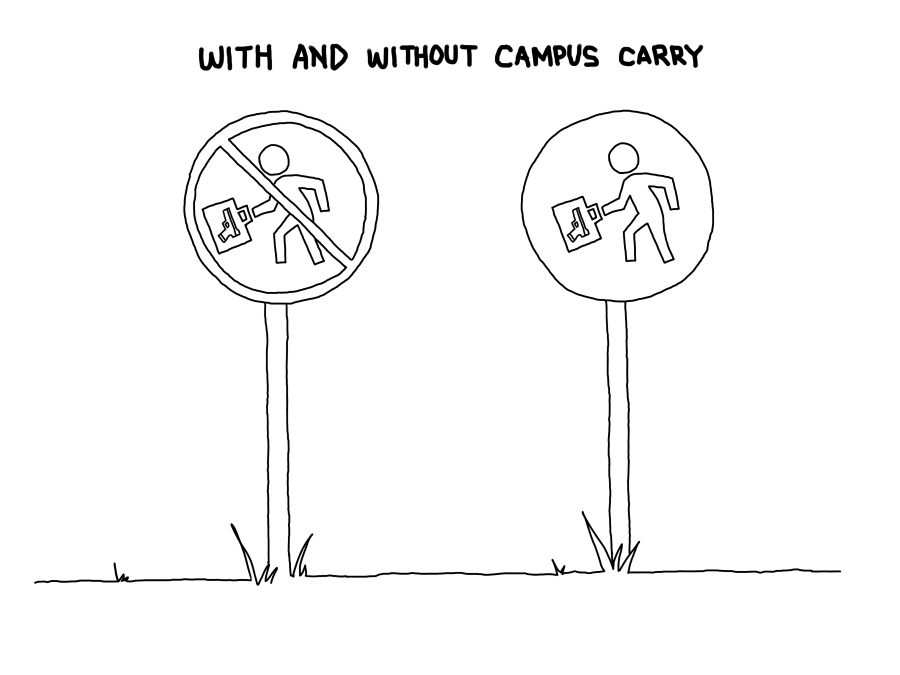Editor's note: This is part of a Point/Counterpoint series regarding campus carry bills HB 937 and SB 11. To read the opposing viewpoint, click here.
On Jan. 26, lawmakers from both houses of the Texas State Legislature filed identical bills HB 937 and SB 11. The guns on campus bills come on the heels of Gov. Greg Abbott’s promise to sign open carry into law at his earliest opportunity, as well as any other expansive gun legislation. Although I would rather the Legislature exercise restraint in this area, I can abide expansion of gun rights within reason. Unfortunately, the guns on campus bills are not.
HB 937 and SB 11 seek to allow any Texan over the age of 21 with a concealed handgun license to carry on college campuses. Texas has acquired 811,000 CHL holders since concealed carry became law in 1995, and it is troubling to think weapons nearly equaling the population of Austin could soon flood college campuses statewide. The simplicity of obtaining a license to carry a concealed weapon — a background check into an applicant’s criminal history and the submission of fingerprints to the Texas Department of Public Safety — does not protect campuses from the guns on campus legislation. According to lawmakers, the purpose of campus carry is to allow law-abiding students to protect themselves from on-campus crime. However, this will not be the bills’ practice. Four of the five violent on-campus crimes reported to UTPD between Dec. 2, 2014 and Jan. 29, 2015, happened at night, when most students on campus were freshmen living in University housing and are inapplicable for the bills’ 21-and-up age requirement. Furthermore, the bills give universities the option of prohibiting guns in residence halls, meaning that the bills’ theoretical beneficiaries are further unprotected by it. HB 937 and SB 11 cannot reasonably offer any protection to the students lawmakers claim to be protecting.
Although the bills include a clause releasing universities from responsibility for any campus carry-related incidents, neither President William Powers Jr. nor Chancellor Bill McRaven supports campus carry. According to Powers, the high-stress environment of universities can lend themselves to volatile situations and bringing guns into the fold only heightens on-campus dangers. Furthermore, the implications of campus carry have not been adequately tested in other states — Idaho’s campus carry went into effect on July 1, 2014; universities in Utah have continuously challenged campus carry; and Colorado allows campus carry but requires additional measures before granting CHLs. The bills’ clauses disallowing public universities from opting out of campus carry adds a distinct division between university administrators, who have been vocal in their opposition, and lawmakers, who seem to think they know best.
The guns on campus bills do more to allow civilians to take the law into their own hands than they do to protect students. Campus carry will create new challenges for law enforcement, as police may struggle to identify an on-campus threat from those confronting it. HB 937 and SB 11 also perpetuate the idea that everyday citizens are the best defense against crime, regardless of training. Results of a 2007 study of the New York City Police Department found that police officers who discharged their weapons within six feet of the target only met with 43 percent accuracy, a rate that dropped sharply beyond this slight range — 23 percent accuracy from 6 to 21 feet, 40 percent accuracy at 21 to 40 feet, 14 percent accuracy at 45 to 75 feet, and 7 percent accuracy at more than 75 feet. According to the NYPD, all weapon discharges occurred under circumstances in which the NYPD shot to kill. Bringing guns on campus under the guise of better protection for students is obvious folly: police officers trained by the state to operate a weapon cannot shoot accurately under duress, nor likely may a civilian with unequal training.
I do not doubt that there are members of our community who carry weapons to campus everyday regardless of law. The difference is that doing so is currently illegal, and HB 937 and SB 11 would legitimize that choice. The numbers demonstrate the slim chance of students apprehending on-campus criminals, and the text of the bills themselves does not protect those most at risk on campus. It is important to understand that campus carry is not a straightforward Second Amendment issue, as one representative suggested when he compared CHLs to taking a test in order to exercise free speech. Campus carry intermingles weapons and education, a dangerous mix. The guns on campus legislation is clever maneuvering by lawmakers under favorable political conditions, not the result of thoughtful deliberation. Students would surely benefit more from a more robust campus police force to combat on-campus crime. This is not a discussion about whether students should have guns. It’s about the fact that no one, student or faculty, should bring their gun to campus.
Smith is a history junior from Austin. She writes about state politics. Follow Smith on Twitter @claireseysmith





















